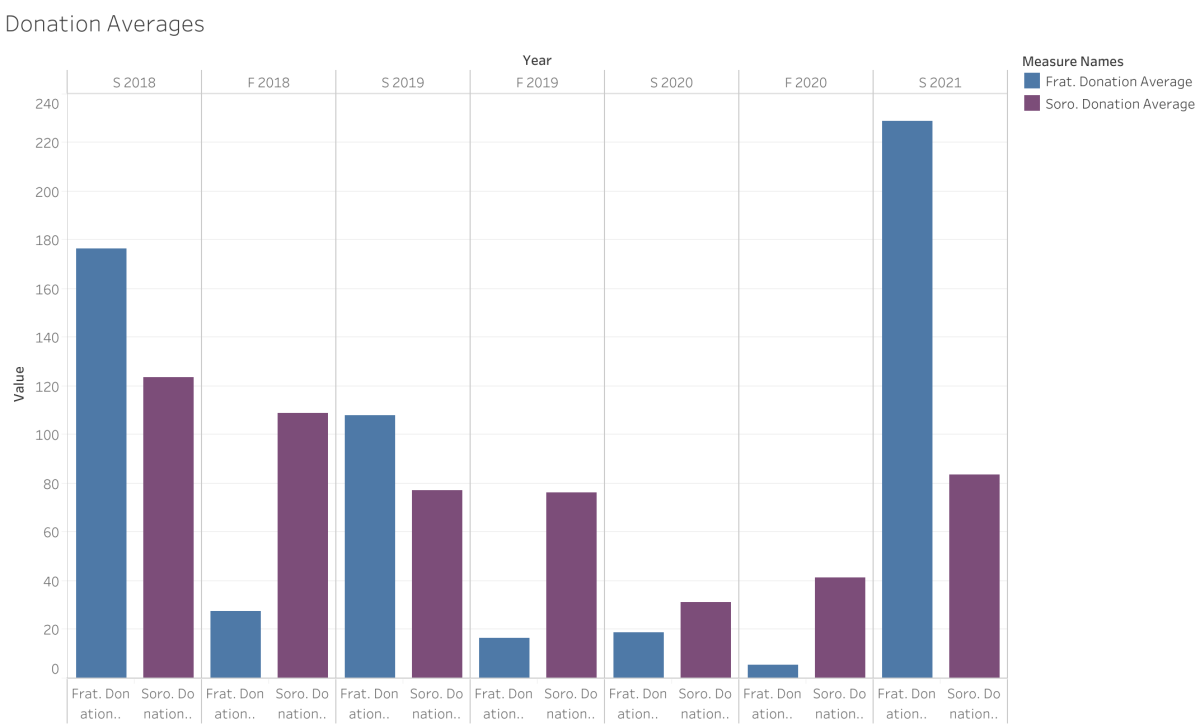Every semester, MU publishes a public breakdown of the numbers of Greek Life in the form of Chapter scorecards. These scorecards provide information such as average GPA and average service hours per member per chapter. The data itself spans eight semesters, from fall 2017 to spring 2021, covering both sororities and fraternities. The numbers listed here are mostly averages taken of averages. What this means is the data can be affected heavily by outliers and represent broader terms ideas.
MU collects the data through self-reported statistics and its own data. Only chapters that have 10 or more members and are within the Interfraternity Council, Multicultural Greek Council, National Pan-Hellenic Council and Panhellenic Association are counted on the cards.
When it comes to academics, the data shows that sororities tend to outperform fraternities. The average GPA since spring 2017 for all fraternities is 3.12 and for all sororities is 3.47. To put these numbers in context, the average GPA for men in the same time frame is 3.06 and for women is 3.34. So, while both fraternities and sororities outperform their average peers, sororities do so by a slightly higher margin than fraternities.
The data also showcases that in terms of community engagement, sororities log more service work hours, whereas fraternities surpass sororities in monetary donations. The fall 2017 semester doesn’t have philanthropy data, so the numbers start in spring 2018. For service work, the average member of a sorority spends 9.71 hours working, whereas an average member of a fraternity spends 7.47 hours working. When it comes to donations, sororities donate $77.5 for every member and fraternities donate $83 for every member on average.
According to the data, sororities tend to report their philanthropic numbers more often than fraternities.
From Spring 2018 to spring 2021, there are 78 instances of fraternities opting out of submitting their service records, as opposed to 20 instances for sororities. For reporting philanthropic donations, fraternities have 63 instances of declining to report, as opposed to sororities opting to not report 18 times.
The scorecards also track violations, which are defined by the Greek Life scorecard as things that go against university policy, such as sexual assault, alcohol-related incidents and hazing incidents.
Fraternities have 79 violations on their cards and sororities have four violations on their cards, meaning that fraternities commit violations at a higher rate than sororities according to the data.
The most common violations are those marked as “Other Violations,” such as recruitment and bylaw issues. Out of the total 83 violations, 45 were “Other Violations,” 29 were “Alcohol Violations” and nine were “Hazing Violations.”
In one section titled “Sexual Assault,” there is not a single violation on the column. It is worth noting that this category only counts sexual assault. This means that instances of sexual harassment, drugging and any other form of sexual misconduct are not recorded on the scorecards. The Rape, Abuse & Incest Network reports in the U.S. that only 310 out of every 1,000 cases of sexual assaults are reported to authorities.
A total of 38 fraternities and 19 sororities are counted on MU’s Greek Life scorecards. Out of those chapters, 29 fraternities and two sororities have violations on their card. For fraternities that have violations, only seven chapters have just one strike against them. Between the two sororities with violations, Gamma Phi Beta has three and Delta Sigma Theta has one.
To access the data featured in this article, visit https://fsl.missouri.edu/scorecards/. New numbers are posted every semester.
Edited by Namratha Prasad | [email protected]













